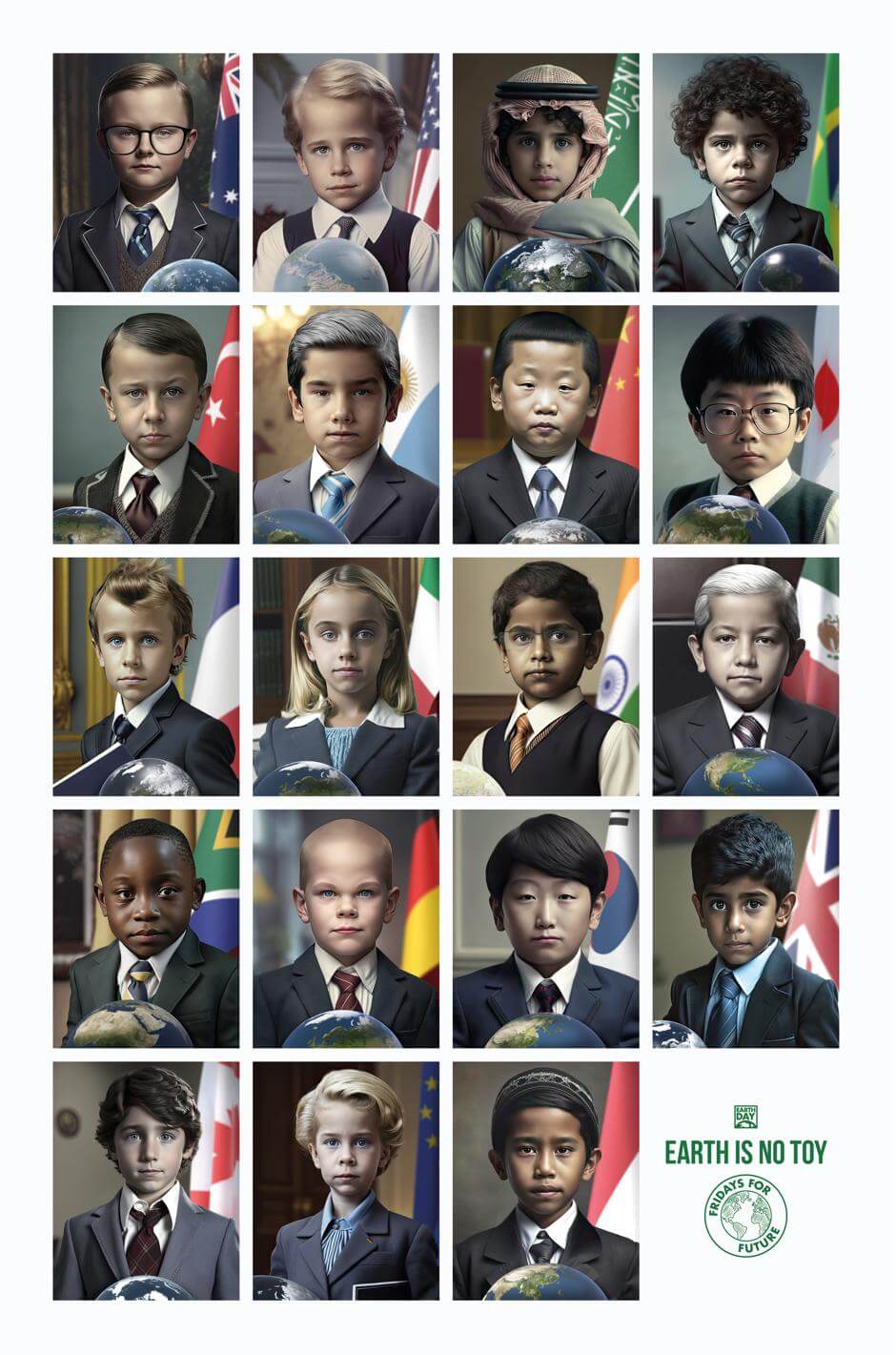Imagine that you have spent the last few decades under a rock, crawl out from under it when spring comes and take a look at the Internet, which has been invented in the meantime, flip through the magazines that still exist, look at the news there and there. At the top of your list of lessons learned, there are probably three pieces of information:
1. Ukraine was invaded by Russia.
2. everything is getting out of hand in terms of climate.
3. Keith Richards is apparently immortal.
TOO LAZY TO READ ON? THEN LISTEN TO ME:
In the blogcast, I read this recent blog article to you. With emphasis, of course!
This leads to the big double question: So what does this mean, and what is to be done?
- The war catastrophe will end one way or another. Who knows when? Who knows how? - Not quickly, and it's already too late for a good ending.
- The climate catastrophe might even be manageable - somehow, more badly than rightly, it is to be feared - and that is then just the world wreck, as we will leave it to Keith Richards: a planet as a hobbyist's dream, nightmare at that.
Particularly with regard to the climate issue, more and more members of so-called civil society are getting moving and mobilizing. Not a day goes by without something happening. The Last Generation, for example, now sticks to crossroads in even greater numbers than Lions Club members in front of their punch huts during Advent, allowing themselves to be ridiculed, insulted and threatened, even arrested. Persistent, courageous, brave.
Fridays for Future organizes climate strikes and much, much more worldwide with indomitable, tireless commitment to ... yes, to do what? To achieve what?
I wholeheartedly admire everything that is literally put on the road here. It is truly grandiose. Nevertheless, I'm afraid that all too much of this passionate commitment misses the mark.
Why? Because one preaches with such courageous consciousness-raising actions to the believers, just the other way around. This was demonstrated to me by the worldwide campaign launched by Fridays for Future on Earth Day. once again abundantly clear. Under the slogan "Earth is no toy", the G20 heads of state are depicted as children holding the earth as a ball in their hands, to remind them that they too were once children, say the people responsible.

The campaign looks magical, I think, but unfortunately it remains completely useless - because what will it achieve? Will one of the G20 pilots addressed pause, nudged by the thought: "Wait a minute - that's right! I was a child once, and I shouldn't play with the planet, sapperlot. It's good that someone is finally telling me that!"
Or will someone in this circle become aware of the climate crisis for the first time as a result of the campaign and now immediately deal with it?
We know the answer, don't we?
The problem is not that those responsible know too little about the climate crisis, but that they do too little - so incredibly little that one can say "nothing" about it, when one looks at the spindly results of knee-jerk action, which is supported by the mindless dualism of "prosperity or environment". That is, by an outdated "us versus them" narrative in which we are the good guys, and thus everyone is against everyone else. "Every man for himself and God against all" is the battle cry in the Ver-Kasperhauserization of our coexistence.
In view of the "Earth is no toy" campaign, the revolutionary (advertising) subjects of Benetton come to mind, under which, for example, the image of a dying AIDS patient was posted thirty years ago to "draw attention to the issue" as if there were no news.
When it comes to the meaning and effect of campaigns like these, the legendary creative director William S. from Stratford-upon-Avon would at best say "Much ado about nothing," or "hot air," to stay in the climate of the metaphor world. That's advertising, too.
What would really have to be done?
Well, for something to change - for consciousness and behavior to change - the story people tell about it has to change. This has never been different, and it applies to the private personal as well as to corporate and societal narratives. When a society's grand narrative goes off the rails, society goes off the rails, as figura shows. And when we think of world catastrophes like the one wrought by the Nazis, we realize that this is incendiary.
But, of course, it also goes into the positive: democracy and civil rights movements, for example, illustrate this through the course of human history: "I have a dream!"
The prerequisite for this is that the story is relevant, true and well told by the right people.
When we talk today about necessary measures to save the climate, we are talking about suffering, deprivation, renunciation and loss - about what can no longer be, must no longer be or can no longer be. Please, who is supposed to find that good? Who is supposed to want to be part of this?
But how about doing that, doing the only thing that has ever brought about positive change: namely, not fighting the existing, but showing a new perspective, a new option - the dream of a better world?
How about politicians - the G20ers and everyone else - not structurally skipping their jobs, but doing what their job is, which is undoubtedly to lead societies, right? If that were to happen, it would suggest the idea that the Kennedys liked to borrow from George Bernard Shaw: "Many see the world as it is and ask 'Why?' I dream of a world that never was, and ask 'Why not?'"
So instead of painting abandonment, loss and despair on the wall, wouldn't it be more rewarding to share the story of liberation from too much? To tell about what we would gain, each one of us and all of us together? To paint the picture of a world where we no longer obsess over the things we obsess over owning, but instead put "love people, use things" on the banner, as Bishop Fulton J. Sheen put it a hundred years ago.
And it is high time that we dig in the fetzendoofe history, which verzapft "the survival of humans at the planet earth". Man is a component of the planet, not an inhabitant. The planet is not a ball, on which critters run around and plants prosper, but a totality. The ocean is not a mass of water with corals, algae and fish in it (or not) - the fish, corals, algae and water are the ocean in its entirety. - Hm?
The new story
That would be new stories, a new perspective, a new option: the New Story that we desperately need.
This new story is ready for all politicians. A new, a big, a better, a real story that they can share in their narratives and stories, as it is called in their jargon, and thus bring movement into the people and people into movement. And towards a better future where we support each other instead of fighting each other. A future in which we want to live, and want our children and grandchildren to live there, to be able to live there, to be able to experience it at all. A future of enabling instead of today's present of hindering and playing off against each other. A future of cooperation, of mutual support, of understanding, of heart building. In this future, we no longer have to try in vain to fill the vacuum of meaning in ourselves, in our companies and in our society through consumption and through material growth, that is, through the exploitation of resources. There, meaning will emerge, as it were, of its own accord.
That won't happen quickly, that's for sure. For this, we absolutely have to think in generations, and like-minded people are needed in all places. In education, in business, in politics, and above all in so-called civil society, we need leaders like these wonderfully committed people who are already at work there in many cases; people who, with a hot heart, a cool head and a steady hand, don't gurgle a quick answer to everything, but ask the right questions. For example: What if, from now on, we no longer do without comfort, but free ourselves from excess?
I have a dream. And that is that this new, relevant story is well told by the right people and shared in number and action by enough people to make a difference.
Then Keith Richards and my grandmother, old Story Dudette, would crawl out from under their rock in a flash and stick gum in front of the front door at the next G20 summit while brandishing a banner that read in rainbow colors, "New Story. New Glory."




